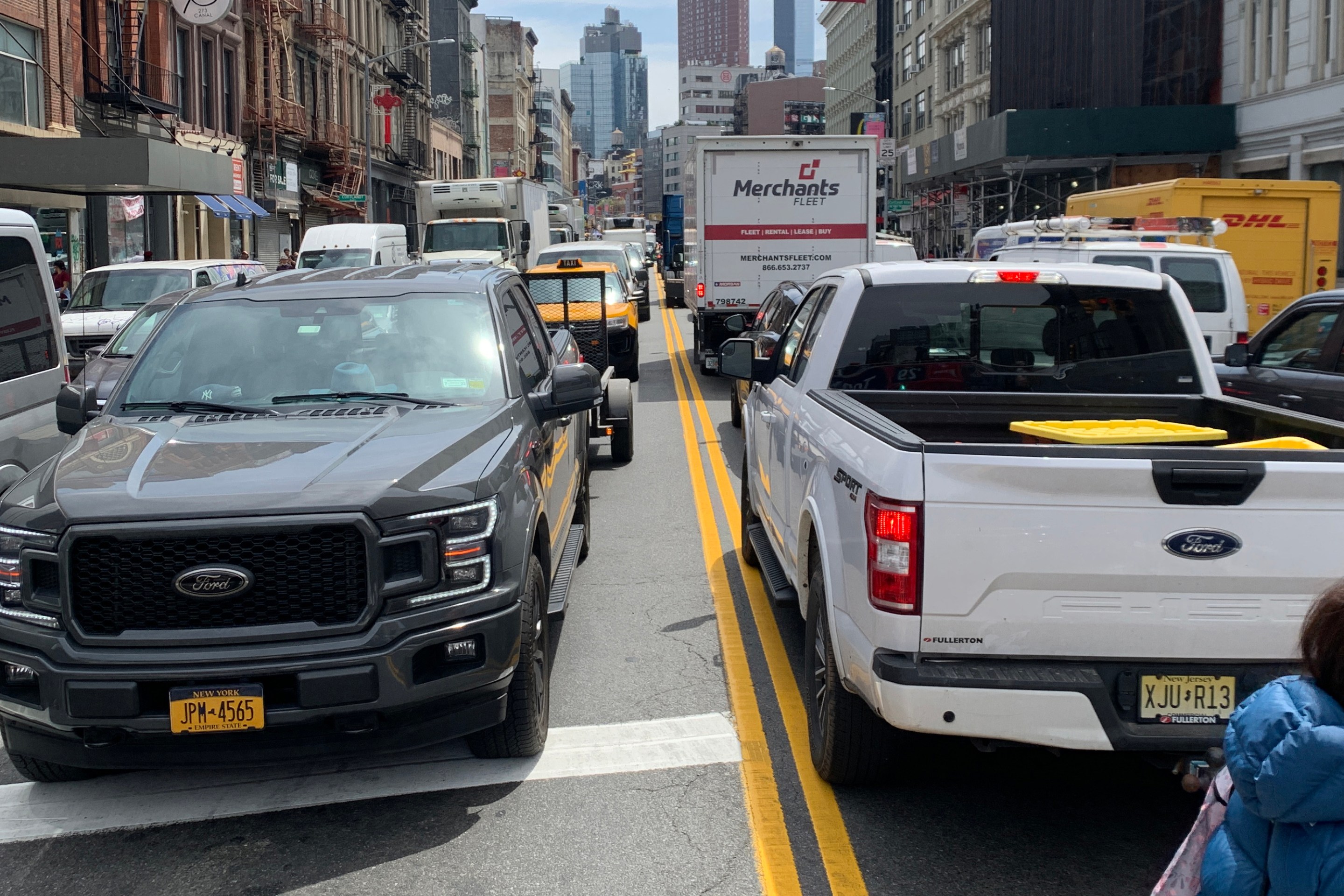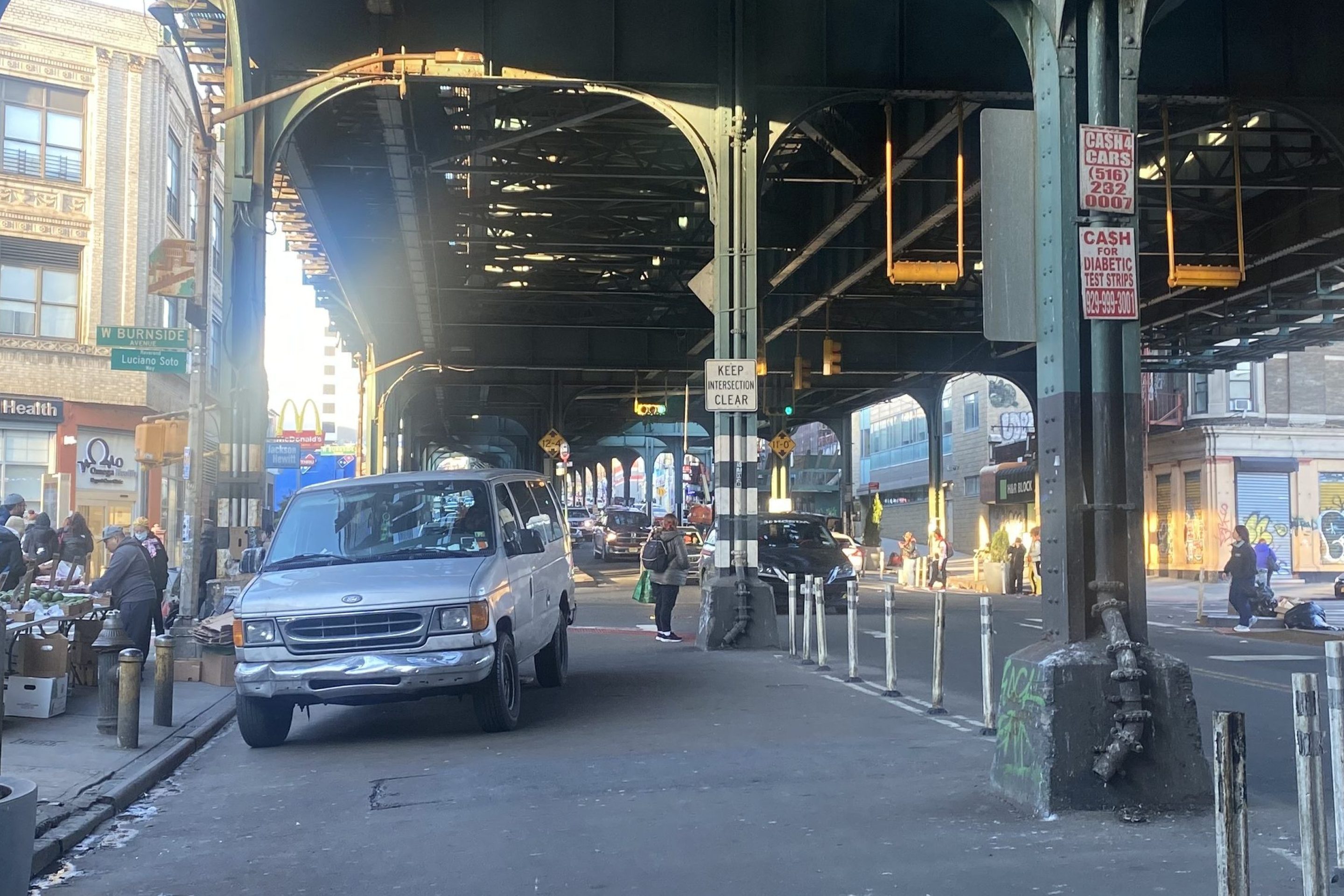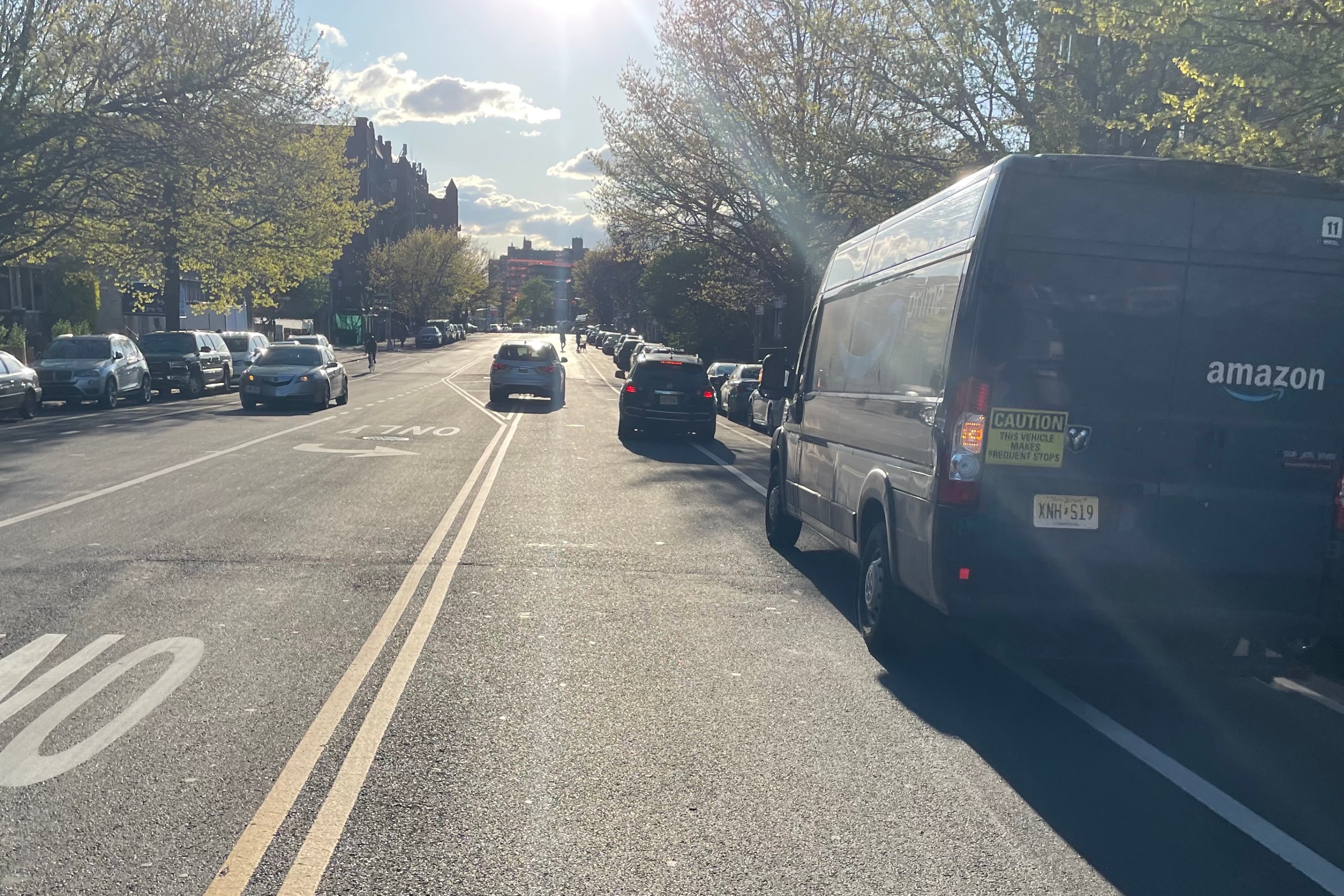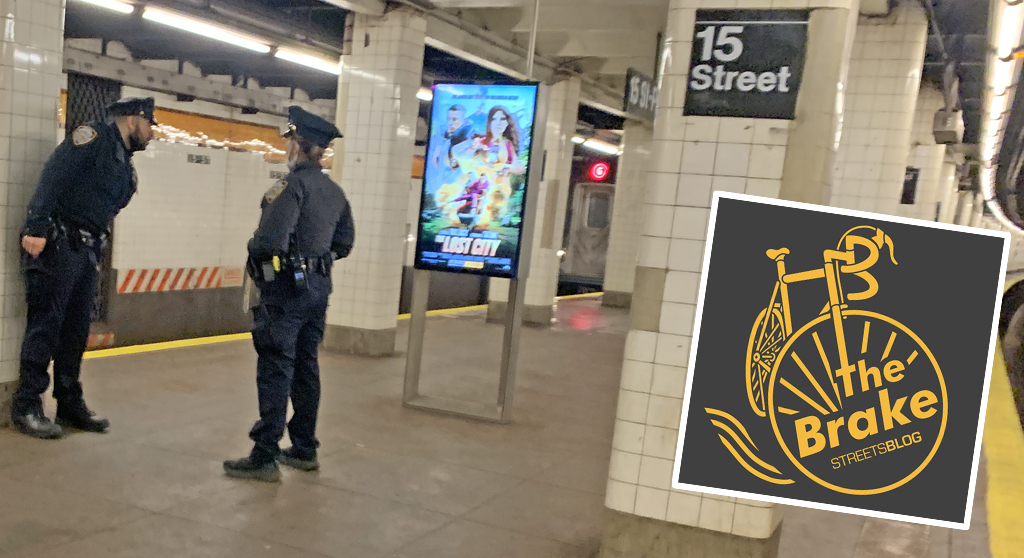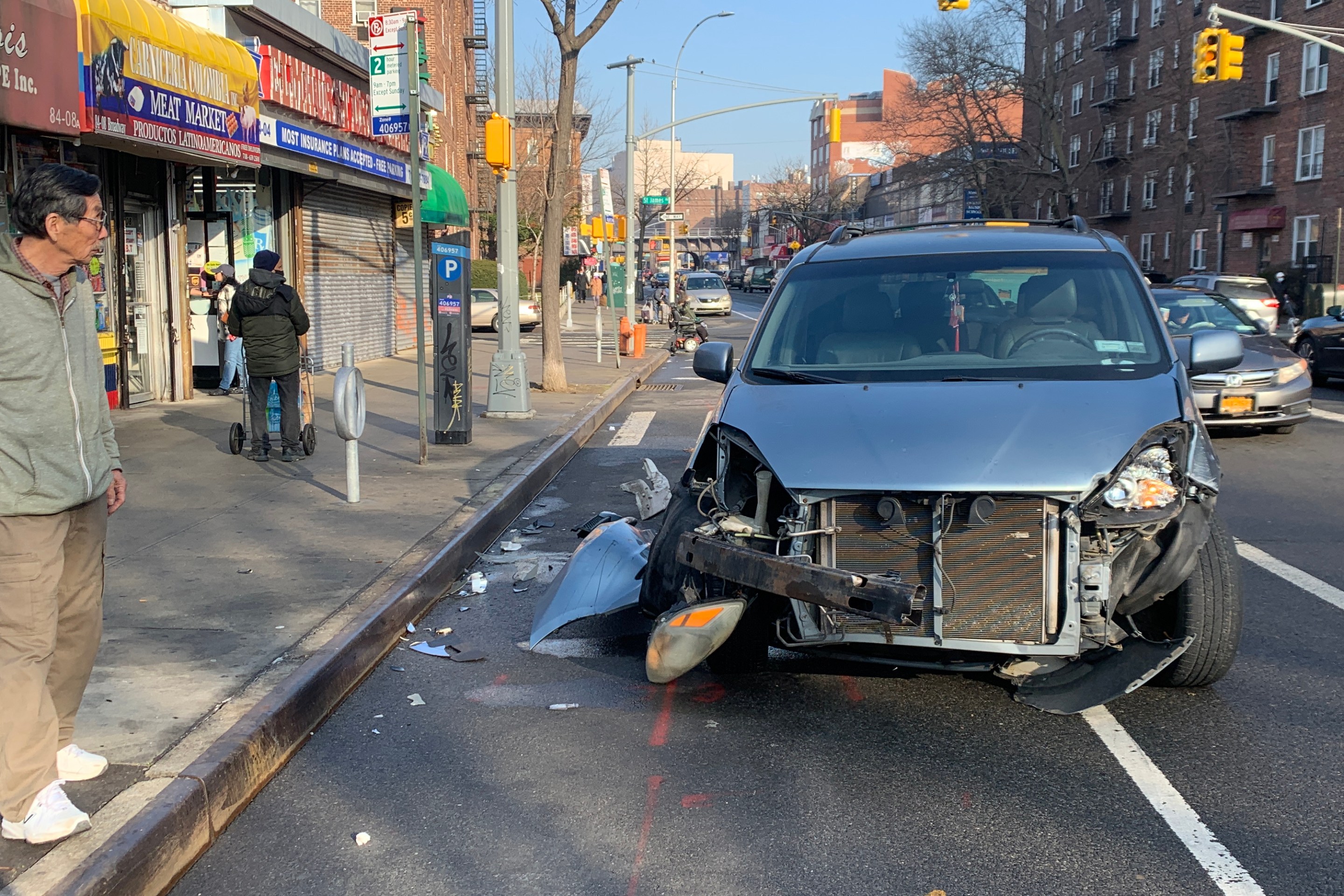‘Permanent and Year-Round’: Mayor’s Restaurant Plan is a Long-Overdue Shift of Public Space from Cars to People
12:11 PM EDT on September 25, 2020
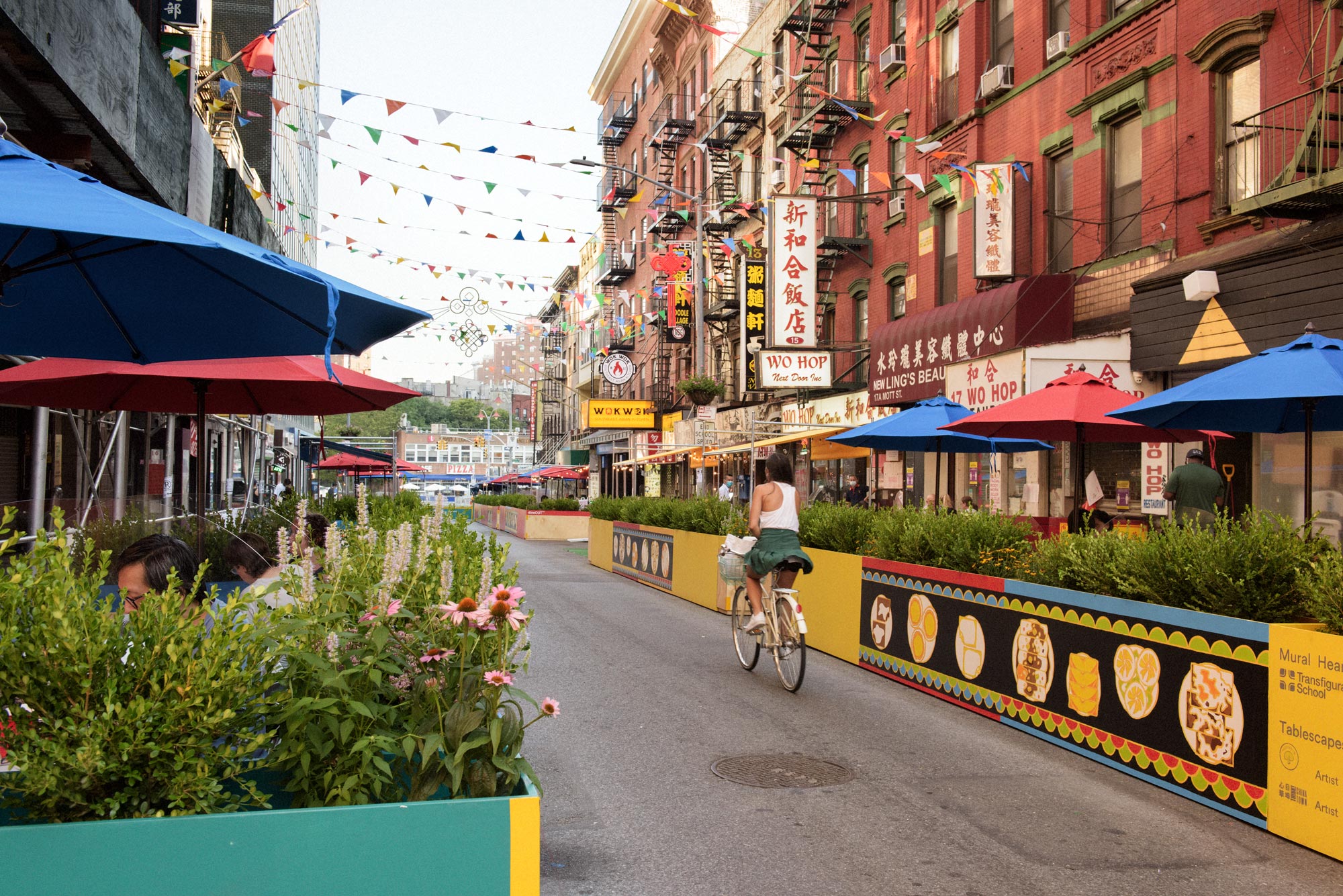
The city is moving to make outdoor dining permanent — like this one seen here on Mott Street last year. File photo: Emily Andrews for Rockwell Group
Tens of thousands of parking spaces will be permanently repurposed from free private vehicle storage for use by the city's struggling restaurant owners as part of a revolution in public space unleashed on Friday by Mayor de Blasio.
On WNYC's "Ask the Mayor" segment, Hizzoner revealed that restaurants would be allowed to occupy curbside spaces — which more than 10,000 are already doing — for outdoor dining, not just through the coronavirus pandemic, but all year and, apparently, forever.
It may turn out to be the single biggest conversion of public space since, well, since car drivers commandeered the curbside lane for free overnight vehicle storage in the 1950s.
"A lot of folks in the restaurant industry have said, 'Could we find a way to build upon this success?' I want to go for the gold here: I want to really take this model and make it part of the life of New York City for years and generations to come," the mayor said. "This has been an extraordinarily positive experiment and it has worked. ... We already have well over 10,000 restaurants participating and almost 100,000 jobs have been saved, and I believe this is going to make it a lot easier for restaurants to survive."
Further details were not immediately provided, but the mayor gave the broad outline (update: full details are lower down in this post):
- Restaurants can set up outdoor dining areas in curbside spaces and along sidewalks as they have been doing.
- Restaurants can also negotiate with the owners of neighboring storefronts for additional space.
- Restaurants can use heaters — specific rules are forthcoming. The mayor only said, "The right kind of heating."
- Restaurants can fully enclose their outdoor seating — but those areas would be subject to indoor dining rules. Indoor dining returns to New York City next week, with strict 25-percent capacity limits. "We want them to enclose their areas, if that's what works for them, but obviously with restrictions on seating," the mayor said. "Or they can keep them open and heated and they can be fuller."
- The city's 87 "open restaurant" streets — which operate mostly on weekends — will also be made permanent and year-round. "That's been a huge hit on weekends," the mayor said. "It creates kind of a festival atmosphere."
The mayor said that he could do some of the above by executive action, but some council legislation would be needed.
Street safety advocates were obviously pleased.
"We commend Mayor de Blasio and the Department of Transportation for closing streets to cars and repurposing curbside space to prioritize people over parking," Transportation Alternatives Executive Director Danny Harris said, citing the "remarkable success" of the program.
But Harris wasn't only talking about restaurants.
"It's been a highly visible improvement to our city during an incredibly difficult period," he said, and then went for the gold himself: "We’re counting on Mayor de Blasio to channel the success and momentum of this massive reclamation of street space and to transform more of our streets into pathways of opportunity for New Yorkers across the five boroughs. New York City’s future must be built for people and not cars.”
And, of course, the restaurant industry was gushing, with Andrew Rigie and Robert Bookman of the NYC Hospitality Alliance calling it an "incredibly important expansion."
“Outdoor dining has transformed New York City’s streetscape for the better and has been a critical lifeline for thousands of small businesses and jobs throughout the five boroughs during the COVID-19 pandemic," the said in a statement. "Today’s announcement to make outdoor dining permanent, to allow the use of heat lamps to keep customers warm outside during the cooler months, and to allow restaurants to utilize adjacent space where feasible so they can accommodate more guests and generate much needed revenue is a major step to rebuilding a stronger, more resilient and livable city.”
The statement ignored the significant revolution in streetscape, which was not lost on restaurant industry consultant, and street safety advocate, Henry Rinehart.
"It is absolutely huge that the mayor is behind a plan to repurpose public space on such a scale, particularly addressing the scourge of free parking and its negative impact on quality of life and, most important, on commerce," he said. "This is a generational shift away from a product that has done so much damage to our city: the car. And it's a huge show of support for small business. It took him a while, but he has delivered."
Rinehart did express some concern for how the winter enclosures would be heated. Few restaurants have the resources to install hard-wired natural gas heaters — which also need FDNY and Department of Buildings sign off — and city officials will likely have a problem with a massive increase in portable propane heaters, which are not only bad for the environment (as Streetsblog reported today), but potentially dangerous.
"The FDNY is always concerned about propane tanks being stored in restaurants, and when the FDNY is concerned, restaurateurs are concerned," he said. "And propane and plywood don't mix well, either. Restaurants will need the resources to build permanent enclosures. We don't talk about this in America, but other countries do a better job. England, for example, subsidized restaurant meals to get restaurants back in business."
Not everyone was pleased, of course. Advocates for street vendors pointed out that the city has continued to crack down on vendors even as it has expanded opportunities for restaurateurs.
By late morning, the City Hall press office offered more specific details to some of Streetsblog's questions, including whether restaurants would be charged for the use of street space — some of which is currently covered by parking meters that generate revenue for the city.
"No," said mayoral spokesman Mitch Schwartz.
More details also arrived in the form of a statement:
Adjacent PropertiesThe city will allow restaurants to expand seating to the frontage of adjacent properties, as long as the adjacent property owners formally agree to the use of the space for a specified period of time and commit not to charge a fee for its use. The city will work with the State Liquor Authority on any requirements associated with extending alcohol service to the expanded seating in front of adjacent properties. In early October, the city Department of Transportation will issue a template agreement and provide instructions on how to file the agreements. Adjacent properties may not be used prior to the release of official instructions and formal agreements.
HeatingAs cooler weather arrives, the city will allow restaurants to incorporate heating elements into their outdoor dining setups. Electrical heaters will be allowed on both sidewalk and roadway. Propane and natural gas heaters will be allowed on sidewalks only; they will remain prohibited in roadway seating. Propane will require a permit from FDNY and compliance with FDNY regulations for outdoor use, handling and secure outdoor tank storage overnight. Official guidance on what will be considered approved installation and use of heating elements will be released before the end of September, and restaurants are prohibited from installing heating elements until guidelines are released and followed.
TentsRestaurants will also be permitted to use tent enclosures to keep diners warm. In partial tent enclosures, at least 50 percent of the tent’s side wall surface area must remain open and electrical heaters are allowed. In full tent enclosures, the tent’s side walls may be closed but occupancy limitations will be capped at 25 percent of capacity, and indoor dining guidelines must be followed; electrical heaters will also be allowed. Enclosed structures, such as plastic domes, will be allowed for individual parties and must have adequate ventilation to allow for air circulation.
Roadway SafetyAs the program’s duration will now continue through the winter months, and winter weather creates potential for inclement weather to impact road conditions, the city will engage the restaurant industry and other stakeholders to develop additional safety features to further strengthen roadway barriers. To ensure timely implementation, the city will require restaurant owners to comply with new safety features by Nov. 15, 2020. In addition, significant snow events may necessitate the temporary removal of some barriers from the roadway.
Reaction from the political elite was initially favorable.
“Outdoor dining has been one of the major successes of the past few months, and the Council is proud to have led the charge to make this common-sense measure permanent," Council Speaker Corey Johnson said in a statement. "We are grateful Mayor de Blasio heard our calls and is taking action on this important issue. Lots of cities throughout the world have permanent outdoor dining, and it is time to bring it to New York City."
The announcement comes just a few days after President Trump declared New York City an "anarchist jurisdiction." Pictures of city residents dining in the street and in curbside areas suggest otherwise:
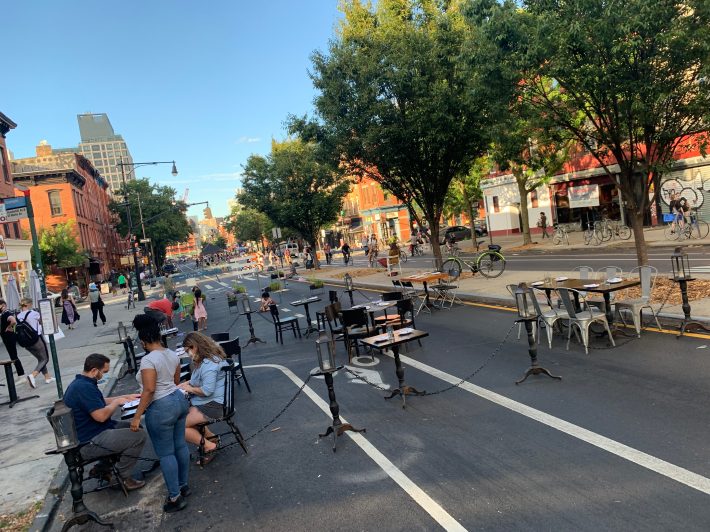
I LOVE MY AL FRESCO ANARCHIST JURISDICTION https://t.co/VaMaXZoJAz
— julia reinstein 🚡 (@juliareinstein) September 25, 2020
Gersh Kuntzman is editor in chief of Streetsblog NYC and Streetsblog USA. He also writes the Cycle of Rage column, which is archived here.
Stay in touch
Sign up for our free newsletter
More from Streetsblog New York City
Friday’s Headlines: Canal Street Follies Edition
Manhattan Borough President Mark Levine isn't happy. Plus other news.
Daylight Again: Bronx Community Board Backs Parking Ban at Intersections
The Boogie Down is down with daylighting!
Community Board Wants Protected Bike Lane on Empire Blvd.
Brooklyn Community Board 9 wants city to upgrade Empire Boulevard's frequently blocked bike lane, which serves as a gateway to Prospect Park.
The Brake: Why We Can’t End Violence on Transit With More Police
Are more cops the answer to violence against transit workers, or is it only driving societal tensions that make attacks more frequent?
Report: Road Violence Hits Record in First Quarter of 2024
Sixty people died in the first three months of the year, 50 percent more than the first quarter of 2018, which was the safest opening three months of any Vision Zero year.
